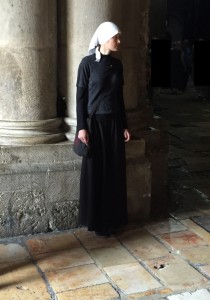by S. Kent Brown
The verses in Luke 21:1-4 frame a bridge that links the Savior’s condemnation of the scribes (Luke 20:45–47) and his warning about the temple’s destruction (Luke 21:5–6). His critique of the scribes is direct and open. At the center of his harsh words stands his rebuke of how some of them treat women, specifically widows, the most vulnerable people in his society. All are under scriptural mandate, especially the scribes, the experts in interpreting scripture, to look out for the best interests of women and widows. But they do not (see Isa. 1:17, 23; 10:2; Jer. 7:6; Micah 2:9; Zech. 7:10; etc.; the Note on 20:47).
 On a similar track, Jesus chastises temple authorities, but his reprimand is indirect. He speaks of the temple and gifts that come to it (see 21:3–4) and its eventual fate, not mentioning priests and Levites directly; yet he implicates them by condemning the temple culture that pays attention to gifts of the wealthy and barely acknowledges the gifts of the poor, in this case gifts from widows, the persons least able to afford to give.[1] But these women give from the inner depths of their souls. And no one notices. Except Jesus.
On a similar track, Jesus chastises temple authorities, but his reprimand is indirect. He speaks of the temple and gifts that come to it (see 21:3–4) and its eventual fate, not mentioning priests and Levites directly; yet he implicates them by condemning the temple culture that pays attention to gifts of the wealthy and barely acknowledges the gifts of the poor, in this case gifts from widows, the persons least able to afford to give.[1] But these women give from the inner depths of their souls. And no one notices. Except Jesus.
Because Jesus notices, he is able to draw his disciples into a lesson of ultimate sacrifice, ultimate devotion, ultimate worship, ultimate discipleship. The poor widow’s gift reaches into the fabric of her livelihood, into her empty cupboards, her spent storage jars, her bare clothes closet, her bed made lonely by the death of her husband. Her gift diminishes her ability to provide for herself in even the most basic ways: “she of her penury hath cast in all the living that she had” (21:4). She is the true disciple, giving all.
Moreover, the widow’s appearance here brings forward, as does the mention of widows in 20:47, the whole matter of Jesus’ interest in families, particularly families who experience enormous challenges in the absence of fathers. How so? Because the Old Testament, the guiding scripture of Jesus’ society, links the welfare of widows closely with that of the fatherless and orphans (see Deut. 14:29; Isa. 1:17; Jer. 7:6; 22:3; Ezek. 22:7; Zech. 7:10; etc.). More than this, scripture insists that the mistreatment of widows and orphans will bring an offender, frighteningly, “into the hands of the living God” (Heb. 10:31; see Deut. 10:18; Ps. 146:9).
In a literary way, Jesus’ notice of the “poor widow” in “the treasury” (21:1–2) forms an inclusio of sorts, bringing to completion a theme that Luke introduces at the beginning of Jesus’ mortal life when his mother brings him to the temple, specifically to the Court of the Women or the treasury, where she pays the five-shekel redemptive price for her firstborn son and where, at a distance, she witnesses the sacrifice of the two birds, a sacrifice of the poor. This aspect of poverty, shared by the young Mary and the widow and emphasized dramatically by the refined and opulent presence of the temple, frames virtually all of Jesus’ mortal life, imparting to his life and ministry a quiet assurance of his concern for those who experience poverty as a part of their lives, for he has known such a life.
Photo credit Kaye Hanson.

